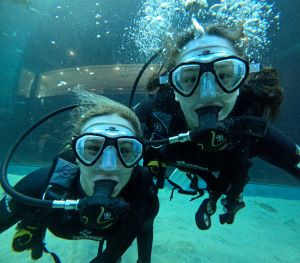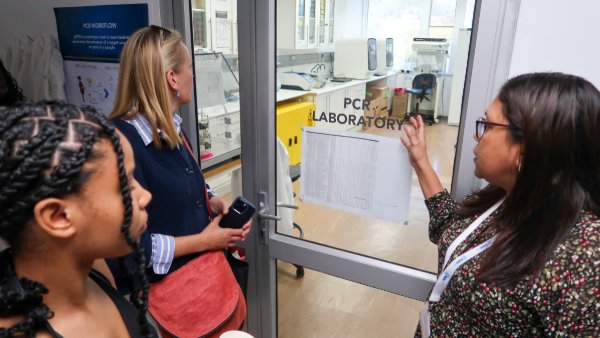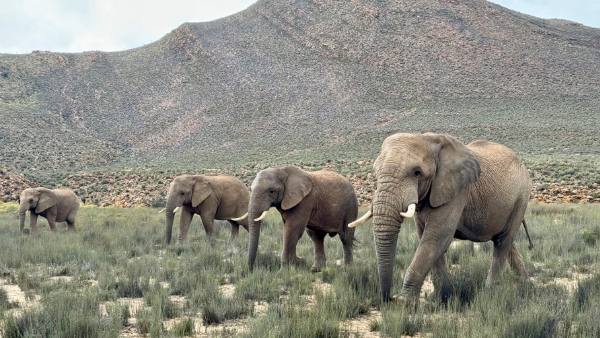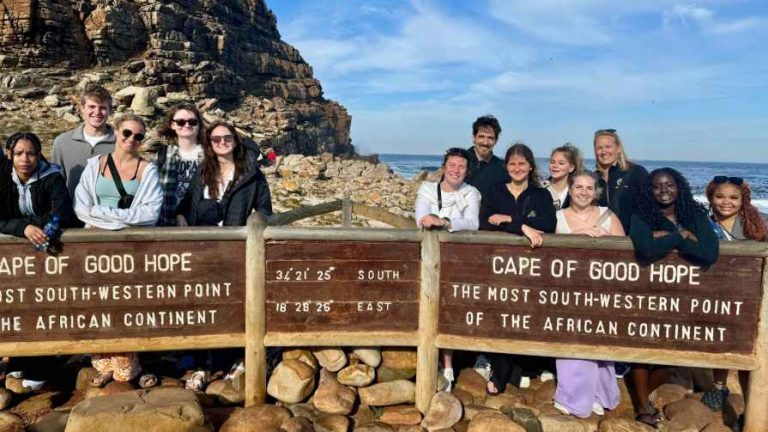The lipoma was larger than expected.
As Amy Ndoye ’25 watched Dr. Chanel Martinussen quickly react to the size of her patient’s benign fatty tumor, her nerves rose at the sight of the South African doctor. Dr. Martinussen quickly administered more anesthesia and widened the incision, all the while reassuring her patient that she would remain awake throughout the three-hour procedure. Dr. Martinussen’s quick response and ingenuity didn’t stop there: When she ran out of gauze during the procedure, she used other absorbent material that was in the room.
Looking around, N’Doye noticed a compact space: just big enough for a hospital bed, a desk, a table for surgical tools, the doctor, the patient, and six Bryant University students, all of whom closely watched the meticulous work taking place before them and handed Martinussen the tools he needed during the operation.
“This surgery really showed me how adaptable you have to be in medicine,” said Ndoye, a biology major who plans to become a physician assistant.

The experiential learning experience at InnoHealth Medical Center in Cape Town, South Africa, was part of the “Challenges in Global Health” course offered by Bryant University’s School of Health and Behavioral Sciences. Students spent the spring semester exploring the health complexities facing the world at large and South Africa in particular, culminating in the course with a 17-day trip to South Africa. On the trip, they toured hospitals, heard from medical experts, and experienced local history and culture, including a safari, botanical gardens, an aquarium, and field trips to the Cape of Good Hope and several historic areas. This eye-opening experience, which reinforced what they learned in the classroom, left many students with a greater understanding of healthcare on a global scale.
Switching time zones
On the evening of May 23rd, 12 Bryant University students arrived in Cape Town accompanied by Stephanie Mott, MSc, Senior Lecturer in Biological and Biomedical Sciences, Kirsten Hoekness, PhD, Dean of Health and Behavioural Sciences, and Alex Perlo, PhD, Professor of Anthropology. After a 19-hour flight, in 60 degree temperatures, the students immersed themselves in the contrasting landscape of mountains and sea.
While the Global Health Challenge has been running for several years, this is the first time the course has focused on and visited South Africa. According to Mott, the country is interesting for a number of reasons. First, South Africa’s history of apartheid has left ripple effects throughout society and continues to impact access to healthcare. Additionally, the country is expected to experience significant population growth over the next 50 years, and the region is already lacking essential healthcare resources. Finally, being in a region where temperatures remain in the 60s and 70s, there is heightened attention on how climate change and the associated extreme weather changes can worsen individual health.
“Studying health care without a specific perspective helped me realize how ignorant I was about global health. My trip to South Africa opened my eyes to the challenges other parts of the world face,” said Victoria Nichelle (Class of ’26), an actuarial science major.
Students toured two public hospitals and four clinics, where they saw people waiting for treatment due to a shortage of beds. At Karl Bremer Hospital, which treats thousands of patients every day, students heard from CEO Dr. Randall Ortell about the role of politics in the quality of care in the public system. In South Africa, public hospitals treat most citizens free of charge, but wait times can be up to two days, Mott explained. Private hospitals are available, but they tend to be much more expensive and aren’t a realistic option for most people.

The clinic seeks to bridge the gap between public and private hospitals, and on day 13, the students visited Plain Community Health Clinic in Mitchell to speak with Chief Medical Officer Dr. Roland Klawkamp. Finding that X-rays, CT scans and MRIs are not available and clinicians must make diagnoses without visual confirmation, Dr. Klawkamp introduced the group to a portable, wireless ultrasound machine he uses for various consultations to ensure more precise care.
“The adaptability of South African doctors has been incredible,” said biology major Riley O’Mara (Class of ’26).
Experience South African culture
Hoping to get a taste of South African culture, students gathered in Yasmin Isaacs’ kitchen for a Malay cooking class. In the classroom, located in the brightly painted Bo-Kaap district (lined with pink, green and purple houses), students learned about the area’s history and influences before helping to prepare a variety of dishes, including samosas, a deep-fried spicy vegetable and meat pastry. Starting with a rectangle of dough, undergraduates folded the thin dough into a triangle, leaving pockets to fill, then filled them and finally sealed the dough with flour paste.
They also explored the country’s historical roots, visiting the Cape of Good Hope and Robben Island, where Nelson Mandela and other political prisoners were held during apartheid.
“Hearing the stories of the prisoners and the island helped me understand how and why South Africa became what it is today,” Ndoye says.
A tour of the District Six Museum, which commemorates the 60,000 residents forcibly removed from District Six during apartheid, reinforced the idea that understanding cultural history can provide insight into the dynamics affecting particular places today.
“Although apartheid was officially abolished 30 years ago, there is so much inequality and if you don’t understand the history, you can’t understand what’s going on,” Mott said, noting that the students observed a historic national election during their trip. “There’s a constant juxtaposition of the haves and the have-nots.”
Leave with new inspiration
The morning was dark and quiet. With headlamps against their foreheads, the college students trudged along the dirt trails of Lionshead Mountain and gazed upon the blanket of glowing light below them. The three-mile trek up the mountain, which stands 2,195 feet above sea level, was worth the early rise.
“The sunrise over Lionshead was one of the most beautiful sights I have ever experienced,” said Luke Mead (Class of ’26), who observed two medical procedures during the trip.

With new heights comes new perspective, and for Ndoye, it was she who came away from this journey with new inspiration.
“I’m originally from Senegal and moved to the United States seven years ago. I was very young when I left the U.S., so I didn’t have a chance to really experience the local healthcare system,” said Ndoye, who plans to become a physician assistant.
Following South Africa, Ndoye visited family in Senegal. With a greater understanding of global health issues, she reached out to several nonprofits in Senegal to see how she could support their work. Now, as she prepares to begin her fall semester at Bryant University, she sees a new opportunity ahead of her: to improve the health of her home country for the next generation.

